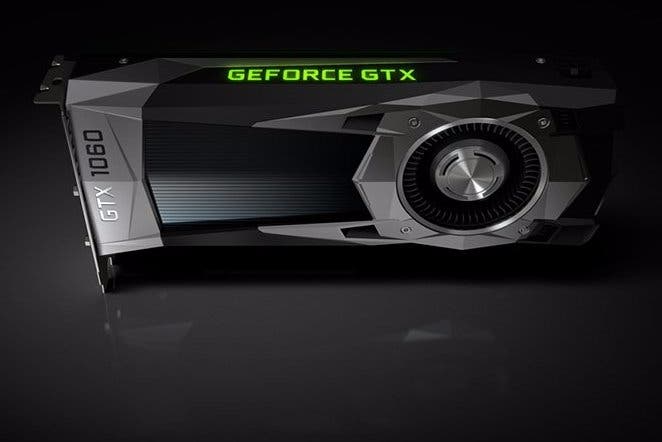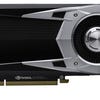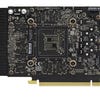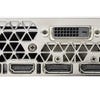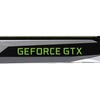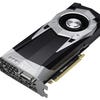Nvidia unveils GTX 1060: $249 buys you GTX 980 power
UPDATED: UK and European prices announced.
UPDATE 8/7/16 3:32pm: Nvidia has just got in contact to reveal European and UK prices for the GTX 1060. We're looking at a base price of £239 for the card, translating into a 280 Euro price tag for those in France and Germany. Meanwhile, the Founders Edition card sees prices rise to £275/319 Euros. All prices include VAT.
Original story: Nvidia has broken cover with details of the GeForce GTX 1060, its first product aimed at mainstream PC gamers. Promising performance in line with its 2014 flagship - GTX 980 - the new card offers 6GB of GDDR5 memory with prices starting at $250.
Physically, the Founders Edition of the card bears some similarity in terms of its design language to the high-end GTX 1070 and GTX 1080, but there are significant differences - primarily in terms of its revised plastic casing. Ports and connectivity are mostly unchanged - there's a single dual-link DVI port, three DisplayPorts and HDMI 2.0. Power comes from a single six-pin PCI Express input, and the board has a TDP of just 120W.
The eagle-eyed may note no SLI connectors on the top of the card - Nvidia is ruling out traditional multi-GPU support, though looking to the (far) future, custom DX12 multi-card support as seen in Ashes of the Singularity should still work. The omission of SLI here is a bit of a shame - hooking up mainstream cards in parallel hasn't been a great idea in recent times owing to their lack of VRAM, a situation that doesn't apply to the GTX 1060.
Nvidia's mainstream offering is based on a new processor design from Nvidia codenamed GP106, which follows the template laid down by preceding designs in that it features exactly 50 per cent of the CUDA cores of the current top-end product. That being the case, the 2560 shaders of the GTX 1080 gets cut back to 1280 in GTX 1060.
| GTX 1060 | GTX 1070 | GTX 1080 | GTX 960 | GTX 980 | |
|---|---|---|---|---|---|
| CUDA Cores | 1280 | 1920 | 2560 | 1024 | 2048 |
| Boost Clock | 1.7GHz | 1.68GHz | 1.73GHz | 1.17GHz | 1.22GHz |
| Memory Interface | 192-bit | 256-bit | 256-bit | 128-bit | 256-bit |
| Memory Config | 6GB GDDR5 | 8GB GDDR5 | 8GB GDDR5X | 2/4GB GDDR5 | 4GB GDDR5 |
| Memory Clock | 8GHz | 8GHz | 10GHz | 7GHz | 7GHz |
| Processor | GP106 | GP104 | GP104 | GM206 | GM204 |
| Power Connector | 1x 6-Pin | 1x 8-Pin | 1x 8-Pin | 1x 6-Pin | 2x 6-Pin |
| TDP | 120W | 150W | 180W | 120W | 165W |
It was a strategy that didn't exactly pay dividends for the outgoing GTX 960, but there is an important difference this time around - rather than limit GP106 with a 128-bit memory bus, Nvidia has upped the ante here, handing in a 192-bit interface.
This configuration limits VRAM options for a mainstream product to 3GB and 6GB - and there has been plenty of pre-announcement speculation that Nvidia would be releasing two SKUs. From our perspective, a 3GB GTX 1060 would offer a fundamental mismatch of processing power and memory, so it's a relief that Nvidia is only talking about 6GB cards in its marketing materials. GTX 1060 is equipped with the same 8gbps memory modules as GTX 1070, so we should be looking at overall memory bandwidth of 192GB/s.
Clock-speeds look very familiar - there's no word on the base clocks, but the boost tops out at 1.7GHz, and assuming the new Pascal chip operates in a similar manner to the existing GP104, real life performance should be 100-150MHz higher depending on the workload. We'll be really interested to see if we can break the 2.1GHz barrier with this chip when overclocking, something that has proven elusive with GTX 1070/1080, but Nvidia has confirmed that 2.0GHz shouldn't be a problem.
Pricing was always going to be crucial for a mainstream product, and with the $249 sticker price, we can almost hear the collective sigh of relief coming from AMD headquarters. Assuming Nvidia's GTX 980 performance claims pan out, we should be looking at a faster card overall, but you're paying more for it. The 4GB version of the RX 480 sitting at $199 remains a pretty good deal, while GTX 1060's 6GB offering is still a touch more expensive than AMD's RX 480 8GB pricing.
Muddying the waters slightly is the fact that Nvidia will once again be releasing a Founders Edition card with a price premium - GTX 1060 FE will sell for $299. Based on our tests with previous Founders Edition offerings, we're still not entirely convinced about charging extra for cards with little in the way of tangible benefits compared to partner cards.
It's all going to come down to performance and Nvidia's claim of GTX 980 performance gives us some idea of how the GTX 1060 matches up to its bigger brothers. Roughly speaking, the GTX 1070 offers around 35 per cent of extra performance compared to GTX 980, rising to around 60 per cent for the GTX 1080. Comparing price-points to frame-rates, this does see the GTX 1060 offering good value, but RX 480 has set the bar in terms of mainstream value so it'll be interesting to see how Nvidia's new offering compares once the benchmarks are in. One area where we should expect to see Nvidia dominant is in terms of power efficiency - the firm says that GTX 1060 is twice as efficient as GTX 980, so it should sit well within the 120W TDP.
In terms of performance comparisons with the RX 480, Nvidia doesn't explicitly name-check the competition, but says this: "Across the top gaming titles, GTX 1060 is on average 15 per cent faster and over 75 per cent more power efficient than the closest competitive product at stock speeds". A 15 per cent increase vs RX 480 does tie in very closely with our GTX 980 benchmarks on a range of DirectX 11 titles, but DX12 does adjust the narrative so we're looking forward to seeing how the 1060 compares.
The GeForce GTX 1060 launches on July 19th, and we'll bring you a full breakdown on the product as soon as we can - plus we'll update once UK pricing is available.
